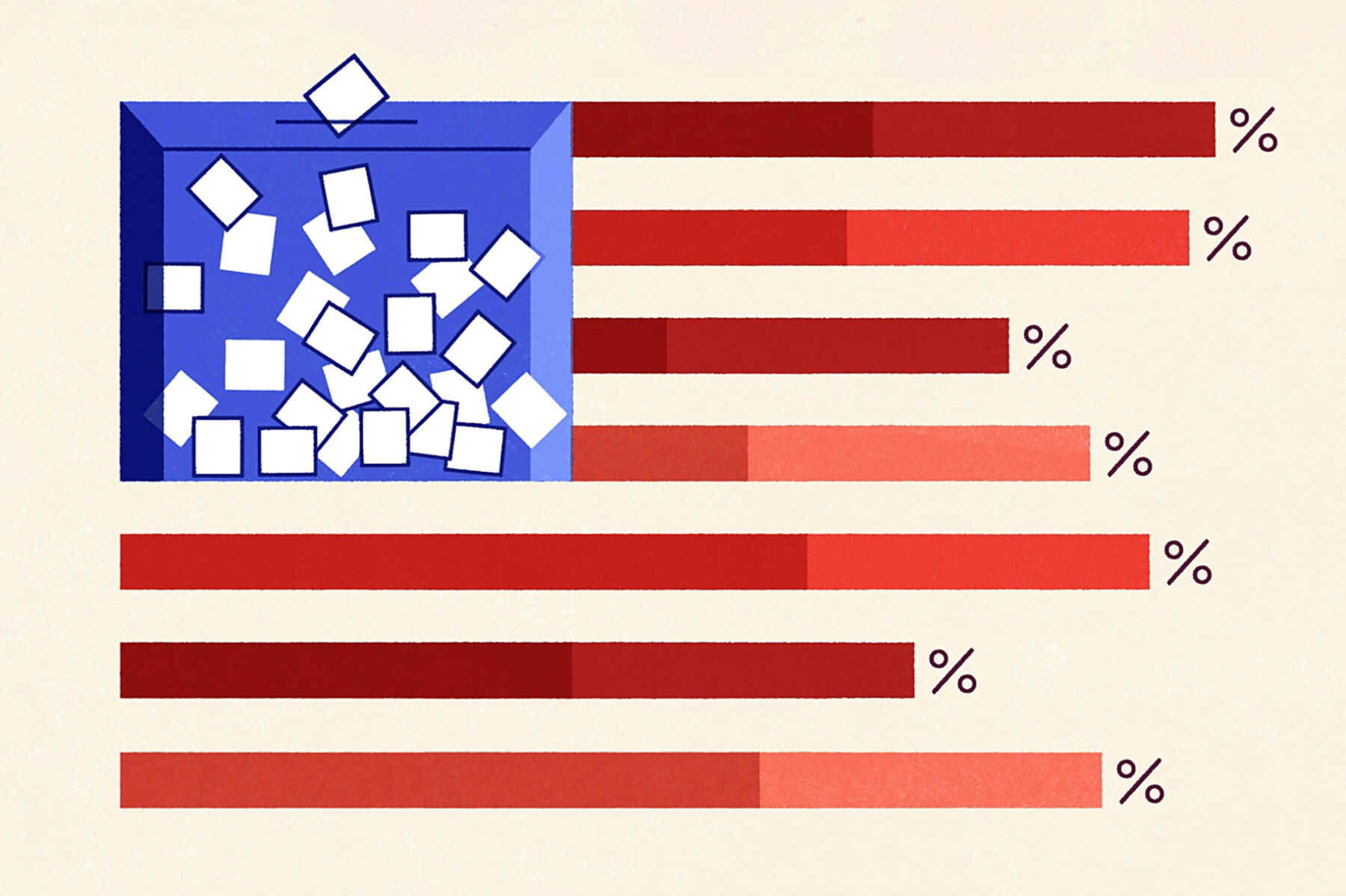

One supply of annoyance over the previous yr has been the blind media parroting of nationwide and native polling. These are offered with out context, framing, and, most significantly, an acknowledgment of the previous monitor document—simply blind repetition of ineffective “information.”
By failing to say pollsters’ abysmal monitor information, the media presents a wildly distorted view of future election outcomes.
Certainly, polling a yr forward of elections incessantly focuses on candidates who don’t find yourself on the poll. Recall in 2007, the polls had a head-to-head that includes Rudy Giuliani and Hillary Clinton (neither grew to become their celebration’s 2008 nominee). November 2023 polls confirmed Biden vs Trump. We all know how that turned out.
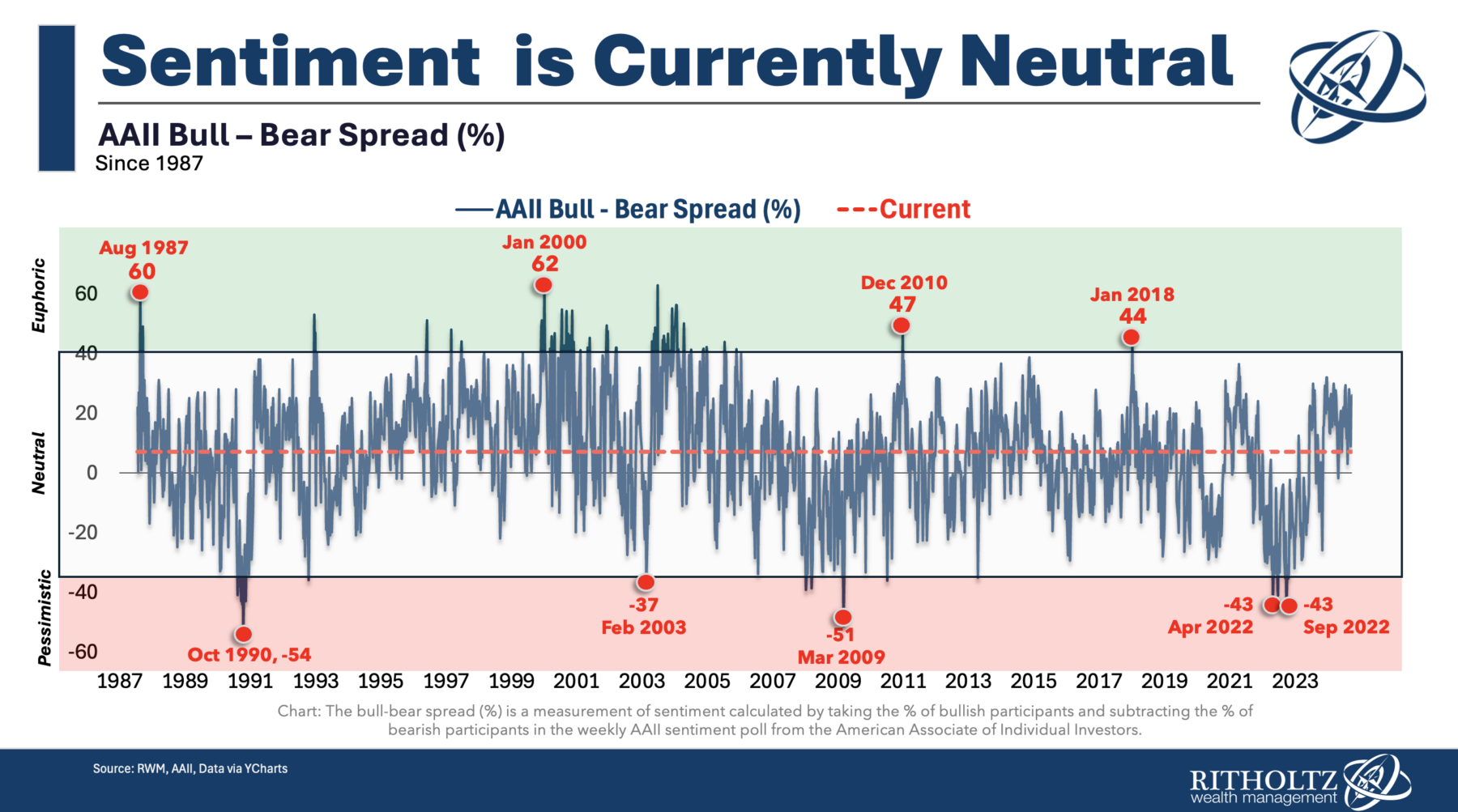

However there may be a good greater polling downside, one that’s unlikely to be solved anytime quickly: Our personal incapability to forecast our future behaviors.
A fast caveat: I’m not a polling professional, however I’ve spent many years learning sentiment information in markets. Lengthy-time readers know that — besides at extremes — I discover little or no usable info in Sentiment information. The reason being that Sentiment measures undergo from issues just like political polling. (Behavioral economics offers perception into each surveys and fashionable polling errors).
Sentiment has 5 key points that make it problematic. It’s:
1. Backwards trying
2. Emotionally charged
3. Operates on a considerable lag
4. Requires correct self-reporting
5. Extremely depending on exact phrasing of questions
That’s nearly primary market, financial, and asset allocation questions. My experiences interacting with many traders over time counsel that folks are likely to have a fluid sense of their very own sentiment, overly depending on what simply occurred in markets. Our capability to self-report our bullish or bearishness is defective. It sometimes displays your current portfolio modifications, not our true future expectations. Sentiment fails to measure these points precisely.
To these 5 primary sentiment points, political polling has extra issues:
1. Landline telephones
2. Voter intentionality
3. Cellphones & Caller ID
4. Voter turnout
5. Voter participation
Let’s briefly contemplate every.
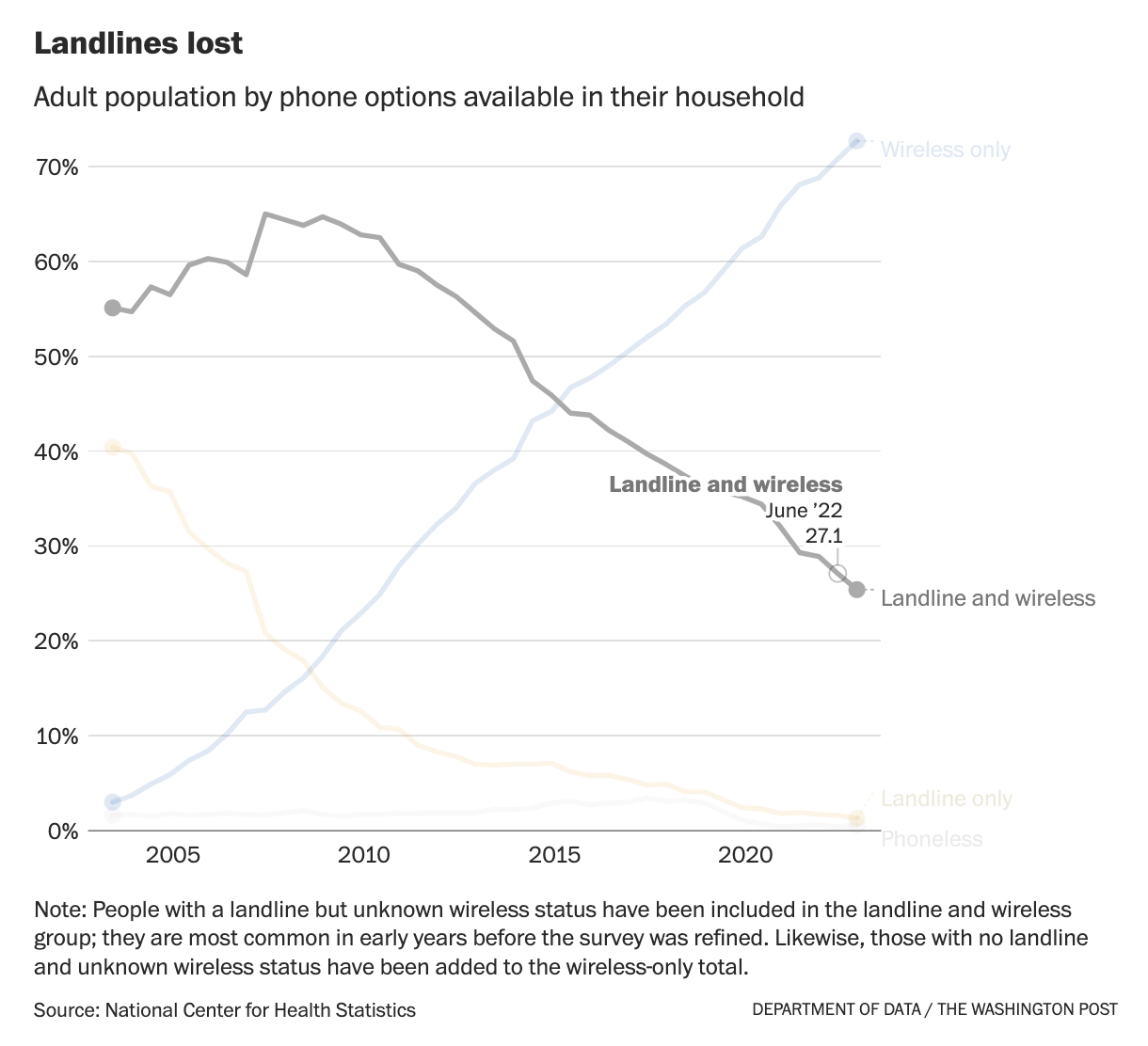
 1. Landlines: In 2000, 95% of American households nonetheless have a landline cellphone. In the present day, it’s merely 27%.
1. Landlines: In 2000, 95% of American households nonetheless have a landline cellphone. In the present day, it’s merely 27%.
Shedding three-quarters of households is a gigantic lower, and this radically impacts who pollsters can attain. (I’m ignoring textual content and on-line polls as they’re even worse than cellphone polls). It’s honest to conclude that this makes making a consultant pool of American voters very difficult.1
2. Intentionality: I consider most (many?) individuals who reply to polls reply truthfully. The issue is, folks usually don’t know what they genuinely consider. (Behavioral finance helps clarify why that is so).
All people is targeted on the undecided. Sure, these “Persuadables” matter. However my guess is that they make up lower than 7% of voters – possibly even lower than 3%. What actually issues to outcomes is who and the way many individuals really solid a vote. No matter whether or not you’re a hardcore political partisan or an unbiased, you could say you’re going to vote — however the information reveals {that a} third of you fail to take action. This habits is what swings presidential elections.
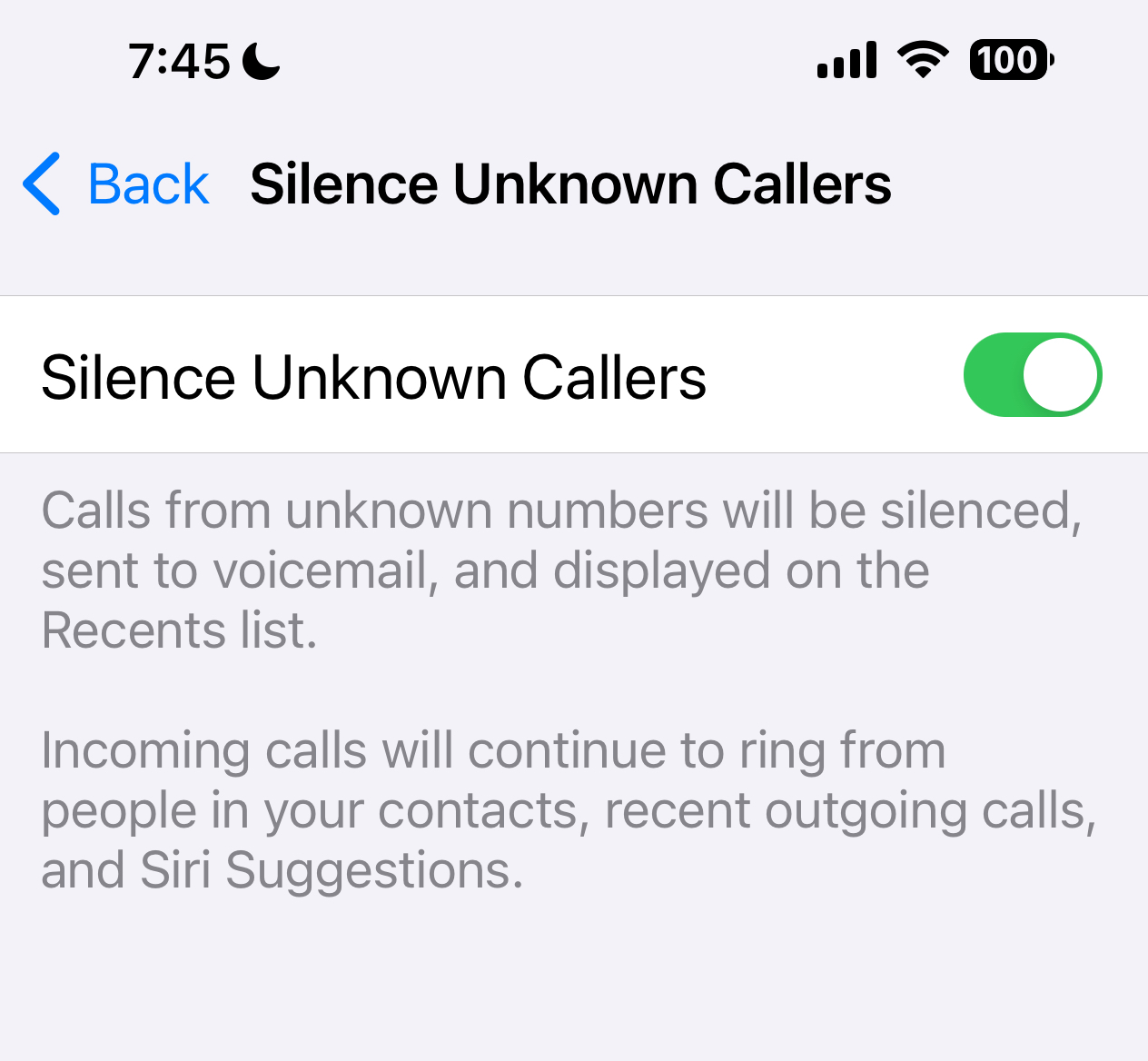
 3. Cellphones (Caller ID): Who’s answering unknown calls on their cell phone? Except you expect a name from somebody whose quantity you don’t have – supply, contractor, physician, and many others. – your cellphone (like mine) might be set to “Silence Unknown Callers.” These go straight to voicemail — and in the event that they don’t depart a message, its most likely spam.
3. Cellphones (Caller ID): Who’s answering unknown calls on their cell phone? Except you expect a name from somebody whose quantity you don’t have – supply, contractor, physician, and many others. – your cellphone (like mine) might be set to “Silence Unknown Callers.” These go straight to voicemail — and in the event that they don’t depart a message, its most likely spam.
Who solutions calls from unknown folks and spends 20 minutes answering questions? I think they aren’t a consultant pool of American voters.
4. Voter participation: The USA has one of many lowest percentages of eligible voters who really take part in presidential elections (it’s even worse for state and native elections, in addition to non-POTUS election years).
PBS, citing information from the USA Election Venture, reported that “solely 36% of registered voters solid ballots in the course of the 2014 election cycle, the bottom turnout in a common election since 1942.”
In 2020, after an enormous voter registration drive, the Census estimated that 168.Three million folks have been registered to vote. This was two-thirds (66.7%) of the full voting-age inhabitants. Most fashionable developed democracies have a lot larger voter registration charges. The UK has 91.8% (2019 parliamentary election); Germany, Australia, and Canada even have over 90% of eligible voters registered. Sweden and Japan mechanically register residents as soon as they turn out to be eligible—they run a close to 100% voter registration charge.
A stunning variety of Individuals assume they’re registered—and lots of will not be. The 80 million eligible folks not registered is a huge variable in terms of polls. No marvel the margin of error is definitely double what is often estimated.
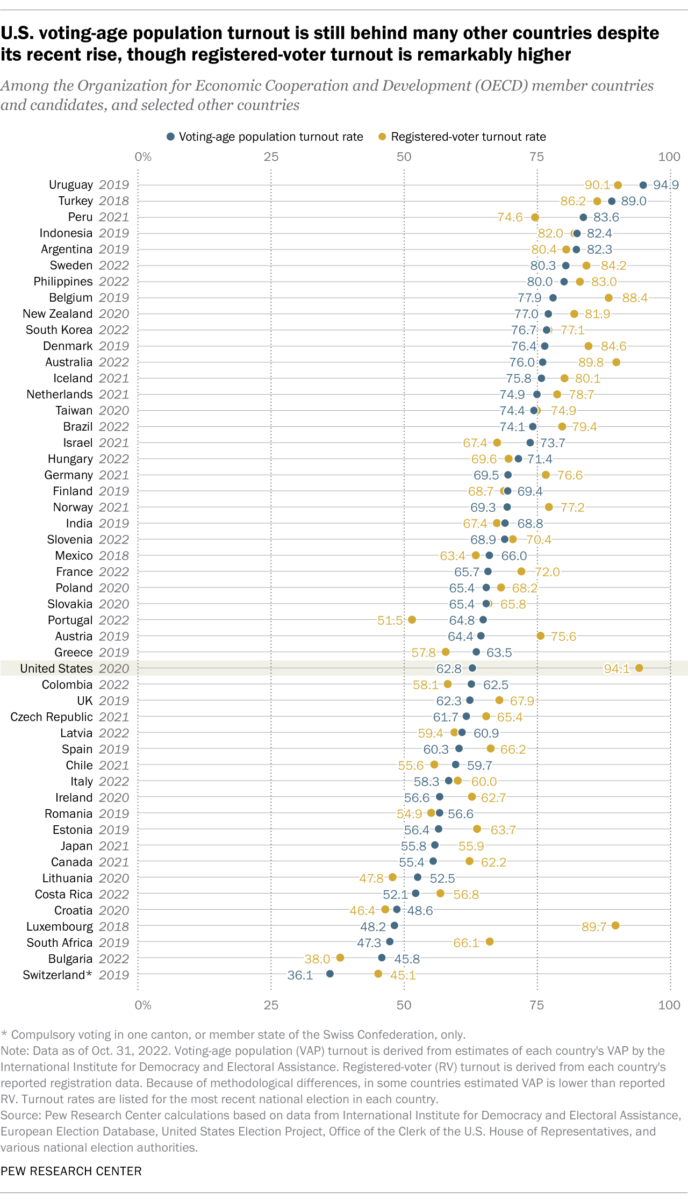
 5. Voter turnout: The important thing problem for pollsters is that folks don’t know what their habits will likely be sooner or later. Because of this polls are merely “honest” a month and “sort of correct” per week or so out, however they’re fully ineffective a yr, six months, and even two months earlier than most elections.
5. Voter turnout: The important thing problem for pollsters is that folks don’t know what their habits will likely be sooner or later. Because of this polls are merely “honest” a month and “sort of correct” per week or so out, however they’re fully ineffective a yr, six months, and even two months earlier than most elections.
Since 1980, turnout in presidential elections has ranged from 50% to 67% of the voting-age inhabitants. The 2020 presidential election had the very best voter turnout in many years, at 66.8%, however this nonetheless pales compared to most different Western Democracies.
Who will get up off the sofa, goes to the native college or library, and casts their vote? The reply is a huge unknown. What is understood is {that a} third to half of eligible voters don’t. That is additionally why a 2-3% margin of error is laughably improper—it’s a lot nearer to a 6-8% margin of error.
For any early ballot to be correct, it should accomplish 5 troublesome duties:
1. Attain a consultant viewers
2. Have folks precisely self-identify
3. Use unbiased polling questions
4. Obtain sincere solutions
5. Get correct predictions of individuals’s personal future behaviors.
The primary 4 all create errors – pollsters can take steps to compensate (partially) for these points, however it’s nonetheless fraught with errors.
The final one is devastating to polling accuracy.
Behavioral finance has taught us that Human Beings don’t know what they’re going to do sooner or later. Whether or not it’s a yr or 30 days from now, we have no idea with any diploma of dependable accuracy. We typically assume we all know what we’ll be feeling that day, we wish to consider that we are going to do what we are saying we are going to, however a minimum of within the historical past of finance, we all know persons are merely horrible at predicting their future behaviors.
How are you going to be feeling one month from now, on Tuesday, November 5, 2024? What’s your bodily state of being? Your emotional outlook? Your psychological well being? Are you excited, depressed, or apathetic? Did you simply begin or finish a relationship? What’s the climate going to be like that day (a surprisingly essential facet of this)?
***
For the previous yr, I’ve been having this dialog with numerous tv and radio personalities, analysts, and pundits. They principally admit to recognizing this to be true. It hasn’t stopped them from ignoring the monitor document of political polls over the previous 10 election cycles. The deal with the horse race, the synthetic creation of a contest, is what the media does finest. It isn’t a lot that they’ve a partisan bias — all human beings do — however somewhat its their business self-interest of something that makes the competition extra thrilling, artificially or not. TUNE IN NOW TO GET THE LATEST OUTRAGE! It’s sensationalism writ massive. The declare that this can be a shut race appears designed to govern viewers into watching extra polls, panels, hypothesis, and opinions. Most of it’s ineffective filler, the remainder of it’s merely nonsense.
It’s disappointing to see core features of Democracy changed with what appears like lazy monetization schemes.
The polling misled folks in 2016 (Trump gained), they didn’t get 2020 fairly proper (Biden gained by a a lot larger-than-expected margin), and so they wildly blew the midterm elections in 2022 (Purple Wave lol). Why folks assume it will likely be something completely different this time is just an ongoing default setting. Maybe it’s that US media is extra centered on elections as sporting-event-like competitions somewhat than delving into precise points, as a result of sports activities is what American media does finest.
Consideration-grabbing click-bait somewhat than coverage evaluation shouldn’t be an effective way for the media to cowl “Democracy.” The repercussions have been having a detrimental impression now for many years…
__________
1. I’ve wished to cancel my landline for years, however, I stay in an space with poor cell reception—I get calls at residence on the cell through Wi-Fi. If the ability goes out and the backup generator doesn’t kick in, we will’t even name our native supplier to alert them we’ve misplaced energy.

